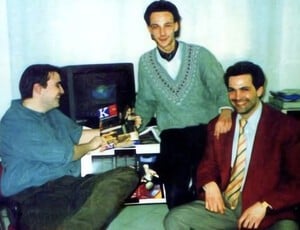
Video gaming, being an interactive medium which makes primary use of the player’s reflexes and ability to react to enemies’ movement, has unfortunately never been easy to access for someone who is physically impaired.
Naturally, that is not to say attempts haven’t been made – and in recent years, things have gotten better, especially for physically impaired players – but how many games have been specifically written and designed with visually impaired players in mind? Probably not many – especially if we go back more than twenty years, and even less would spring to mind if we think about a blind protagonist being central to the story. It would seem that the honour of being the first game of this type would have go to a title made in Italy: the 1996 FMV point-and-click adventure Blindness, which features an 'interactive 3D audio system' that means it can be played by blind people.
Blindness was developed by Dedalomedia, a small studio in the north of Italy which was not new to adventure games. They had previously developed Evocation, a series of first-person adventure games in the style of Myst, first available on Mac and then later converted for PC. "I wrote the story of Evolution while thinking of a philosophy teacher guiding his pupil, testing him to see if he’s ready," says Luigi Alberton, who was also the writer for Blindness. He goes on to recall how, being someone with a literary background, he really had nothing to do with the world of video games. "Dedalomedia was quite a small company at the start, there were only three of us, with Alberto Cobre being the main programmer on Evocation."

The Evocation series had its moment of fame with the third title, released by Mondadori – a famous Italian book publisher – which was an adventure with pre-rendered 3D graphics on CD-ROM. It was through the very same publishing agreement with Mondadori that Dedalomedia was allowed to, for their next title, aim a little higher. The idea, apparently, came during the development of the final scenes of Evocation. "We were designing a scene in the game and thought that it would look exactly as atmospheric without visuals, keeping only the audio," recalls Enrico Gramatica, who served as a programmer on the project.
While the team soon concluded that it was impossible to develop an audio-only game, they settled for a more ambitious idea. "While it was definitely a risky project, we quite liked the idea of developing a game that could be also enjoyed by visually impaired people," Alberton continues. “We worked with several institutions to understand how a blind person goes through life, as to better understand how to write the main character and best develop the project." In the end, Dedalomedia settled for developing a holophonic 3D audio system. "The mouse pointer in the game acts as the blind person’s cane, by moving it around, one can feel its position in a 3D space so that the player could be fully immersed in a cinematic experience,” explains Alberton.
The story sees the blind protagonist, Simon, being caught in a mysterious game of cat and mouse with a serial killer. His friends are being murdered one by one, and Simon will have to either stop the killer or end up in jail, since he’s also the main suspect. After casting Cesare Bocci (perhaps a familiar face for any fans of the Inspector Montalbano series) as the main protagonist, shooting began in the Fall of 1996. "We were using one of the first Sony digital cameras on the market," Alberton tells us. "Even though most of the troupe was quite experienced (they were from Cinecittà), they had never worked with digital equipment." He adds that “the cameraman was worried, thinking that his role would soon become extinct!”
Alberton, who also served as production manager for the shooting, remembers a whole series of problems. "First, we found out that half of the footage we shot the first few days was unusable because one of the cameras wasn’t set up properly. So we threw the whole shooting schedule out of the window. Then, the motorcycle we were using gave up the ghost, so we were forced to walk around the beach, at Ostia (near Rome), with a megaphone hunting for someone who had a similar motorcycle that we could use for a few scenes!" Finally, even Bocci had some personal problems and had to leave the set for a few days. Blindness definitely had a rough shooting schedule, to say the least.
In the end, some of the script had to be cut to make up for the lost time, but somehow, Dedalomedia managed to hand in the game on time for the scheduled late November release. Unfortunately, Blindness was received with mediocre reviews and not really great sales. "Looking back, I can understand the public’s reaction," admits Alberton. "The first hour of the game ended up not being particularly exciting. Blindness only really picks up later, but one would have to play it that far to find out.” Alberton also comments on the project as a whole, noting how it ended up costing the same as a small independent movie, while having "none of the excitement of cinema, we definitely couldn’t feature exciting action scenes or big name actors."
After the release of Blindness in 1996, with publisher Mondadori also abandoning the market of multimedia products, Dedalomedia decided not to make any other FMV adventure games. Alberton recalls that the budget was too high and it was also quite hard to find an audience. "We were spending almost as much as Sierra Interactive, but not having anywhere near the same audience," adds Gramatica. The company would still release one final adventure game, Vitae, in 1997, but this was definitely closer in style to Evocation (and Myst). Deadlomedia then moved on to other projects, leaving behind gaming for good.
Despite being relatively obscure even in its native country, Blindness brought to the table some quite advanced ideas for accessibility, setting its sights very high for the mid-'90s. Unfortunately, despite the country’s famous cinematic industry, the FMV adventure genre never really caught on in Italy, and there were really no more adventures in the style. Still, Blindness’ ideas for accessibility live strongly today, and the game walked an unfamiliar path that is now being explored by other developers in the hope of making video games truly for everyone.
